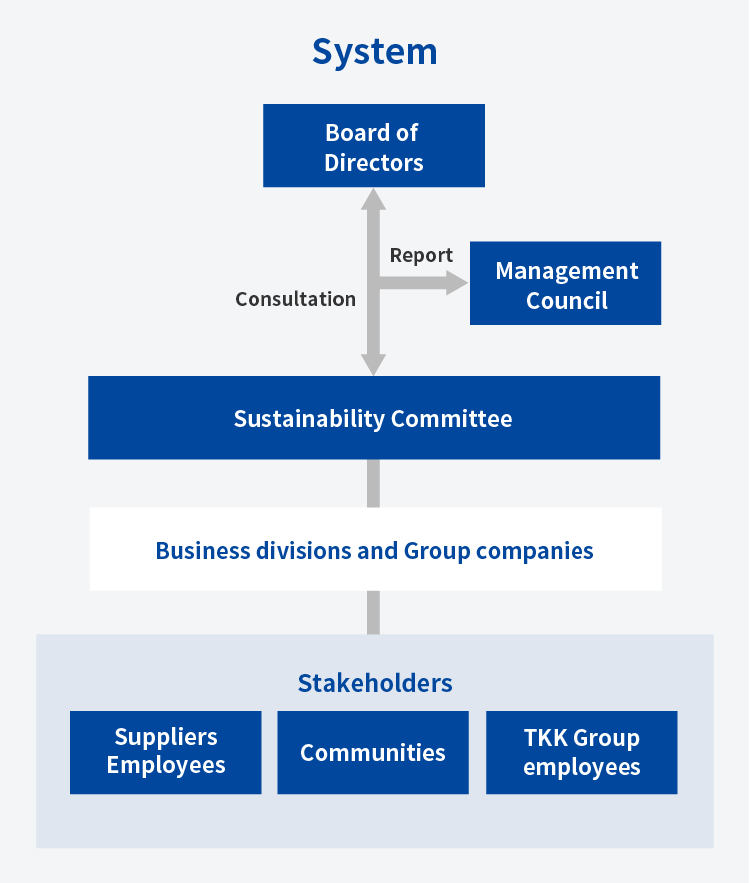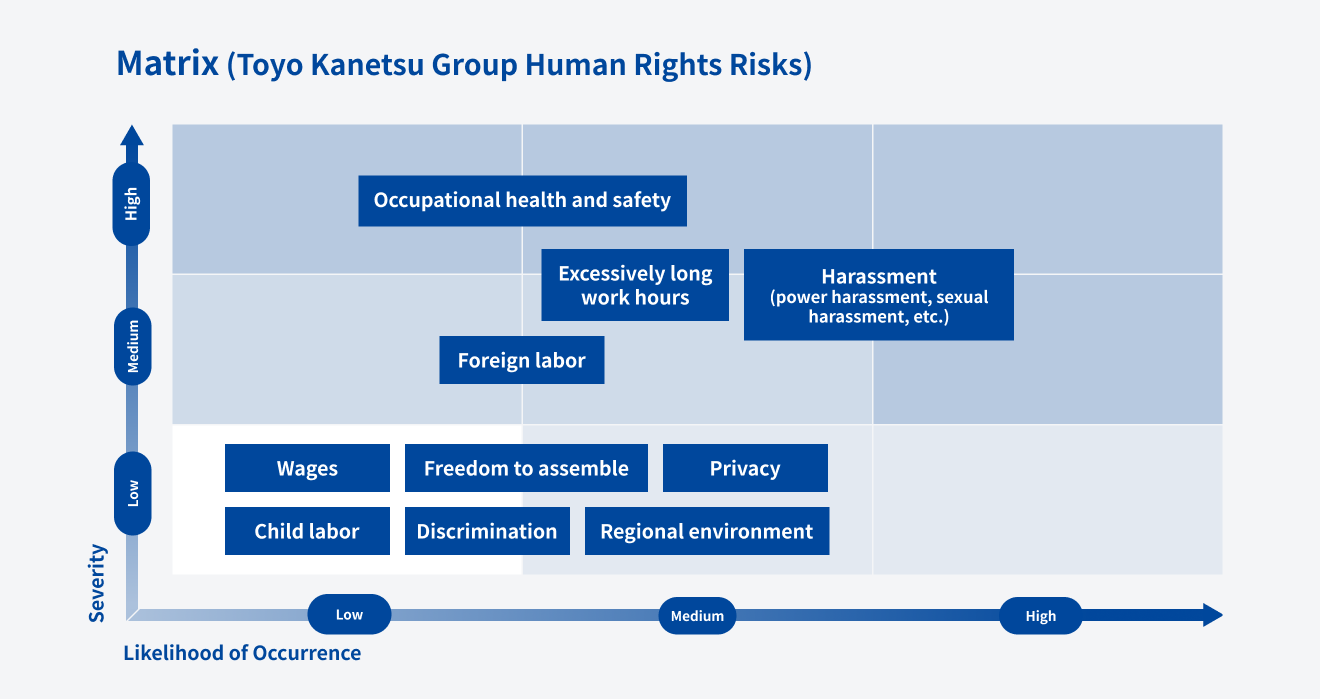Human Rights Policy
Formulation of Our Human Rights Policy
The Toyo Kanetsu Group, with the approval of its Board of Directors, formulated the Toyo Kanetsu Group Human Rights Policy in July 2024. We will work to ensure that this policy is understood thoroughly by all Group officers and employees, and that human rights are respected.
Toyo Kanetsu Group Human Rights Policy
Toyo Kanetsu recognizes the following as human rights risks that are highly relevant to the Group’s business activities. We comply with the laws and regulations of each country and region where we operate, while striving to create a safe and secure work environment where all employees can fully realize their potential.
- Occupational Health and Safety
We strive to create a safe and healthy work environment with zero industrial accidents. - Discrimination and Harassment
We strive to eliminate discrimination and harassment.
We do not discriminate on the basis of race, religion, gender, age, sexual orientation, physical disability, nationality, or any other such characteristic. - Excessively Long Work Hours and Wages
We comply with all local labor laws and regulations regarding wages and working hours in the regions in which we operate.
We comply with the laws and regulations of each country and are committed to reducing excessive working hours. Our fundamental policy is to ensure all employees receive a living wage in addition to complying with wage and related labor laws in the countries and regions where we operate. Based on the principle of equal pay for equal work, our compensation system does not discriminate by gender or other attributes for employees in the same position. - Privacy
We will work to protect personal information in a way appropriate for the environment. - Regional Environments
We will always consider the local environment regarding noise and water throughout the lifecycle of our operations. - Freedom of Association and the Right to Collective Bargaining
We respect the freedom of association and the right to collective bargaining. - Forced Labor and Child Labor
We do not allow any form of forced or child labor.
During the hiring process, we verify applicants' age through submitted documents (including residence cards for foreign workers) and ensure that employment conditions are clearly communicated and confirmed prior to onboarding.
We adhere to the "Children's Rights and Business Principles."
Please note that we do not employ individuals under the age of 18. - Foreign Labor
We shall uphold the rights of foreign workers. - Human Rights Initiatives at Suppliers
Should we become aware of a human rights violation at a tier 1 supplier, we will take action to mitigate or prevent further impact by said supplier. We will maintain a general awareness of possible human rights violations in the supply chain and our procurement activities, ensuring that we always act in a responsible manner in line with our core values. - Occupational Health and Safety
- Harassment
- Excessively Long Work Hours
- Violations in such areas as occupational health and safety, harassment, and excessively long work hours are all problems that tend to be more common than in other industries, and some of these human rights risks have become apparent within the Group.
- Our approach to occupational health and safety has focused on the resolution of issues through efforts spearheaded by the Safety, Environment, and Quality Assurance Department and the setting of related KPIs. Moving forward, we will continue to strengthen these activities.
- Through ongoing training and other awareness-raising activities, we can mitigate and prevent risks such as harassment, a rather typical, frequently occurring risk.
- Group companies have also adopted the means to monitor overtime work and standardize work hours to prevent any violations of Articles 36 of the Labor Standards Act in Japan.
-
※
A survey of our major partners revealed that no particularly high human rights risks are present.
Education and Training
To promote understanding and thorough implementation of this policy among all officers and employees of our Group, we make the program available in multiple languages according to the locale where we do business and provide it to our employees globally.
In addition, all employees, including management, undergo compliance training every year. In the course of this training, employees learn how to deal with labor-related issues, address incidents involving various forms of harassment, use the helpline, and implement procedures for responding when reports are made. We also carry out an annual compliance self-assessment for all group employees.
Promotion Management System
Ultimate responsibility for our corporate efforts and commitment to uphold human rights are led by the President & Representative Director of Toyo Kanetsu K.K. The Sustainability Committee acts as the governing body for these initiatives, with its Chairperson serving as the person in charge of promotion and oversight. Working in collaboration with all departments, we monitor human rights issues within our operations and report them to the Committee, ensuring a unified group-wide approach.
The Committee also implements various measures in accordance with the United Nations “Guiding Principles on Business and Human Rights.”
All matters discussed by the Committee are reported to the Board of Directors each time they occur. The Board is responsible for oversight and, when necessary, makes formal resolutions.


Human Rights Due Diligence
We conduct human rights assessments to identify and evaluate potential human rights risks in all new and existing business operations.Identification and Evaluation of Human Rights Risks
Internal Research and Surveys
To formulate a human rights policy, we conducted internal research (data analysis) and surveys (including interviews) among the Group companies and at our major partners to identify and evaluate human rights risks.Potential issues outlined in the International Labor Organization Convention and other documents such as the United Nations’ Universal Declaration of Human Rights were selected for further examination based on their relevance to the Group companies and our industry.
Main Survey Questions
The survey included a number of topics, especially around forced or child labor, working hours, freedom to assemble, safe working conditions, impacts to environment and other privacy rights, etc.
Results
Based on the results of the survey, we were able to chart the severity and probability of specific issues as shown below.

Human Rights Risk Relevant to Group Business Activities
Reasons for Identifying and Evaluating Risk, and Response
Status of Measures and Initiatives
Education, Training, and Awareness-Raising Activities
We hold regular trainings and implement awareness-raising activities to prevent harassment, in addition to other programs aimed at enhancing diversity, equity and inclusion.
Conducting Monitoring Investigations
To ensure full compliance with labor laws, including eliminating any violation of Agreement 36 (Article 36 of the Labor Standards Act), we have implemented strict time management practices. These include visualizing labor data through an attendance management system and requiring advance approval for overtime work. We also issue alerts when overtime exceeds a certain threshold and conduct regular monitoring of working hours, including by senior management. These measures are part of our efforts to reduce excessive work hours and promote work-life balance.
Additionally, we conduct annual engagement surveys and other assessments to better understand and improve the work environment.
Future Response Policy
Based on survey results and feedback from other activities, we continue to improve the quality and impact of the initiatives taken by the Group.From the next fiscal year onwards, we will expand the scope of surveys regarding human rights risks at our suppliers (partner companies, etc.).
Relief Measures
Status of Initiatives
We have established an internal reporting and consultation system called the “Helpline” for employees of our group companies. This system ensures the protection of whistleblowers by prohibiting any disadvantageous treatment and maintaining confidentiality, and it also accommodates anonymous reports.
Additionally, we have set up a reporting (complaint) channel for our suppliers and business partners. Whistleblowers are equally protected through this system, which prohibits any disadvantageous treatment and safeguards confidentiality. Reports are accepted through the “Contact us” form.
Policy Response
We continuously monitor the usage of reporting channels such as the Helpline and remain committed to strengthening our efforts in preventing human rights violations and responding promptly and effectively when they occur.
Promoting Diversity, Equity, and Inclusion in the Workplace
At our Group, we are committed to preventing discrimination in the workplace and ensuring equal opportunities for all employees. We have implemented the following initiatives:
Hiring of Diverse Talent, Including Foreign Nationals
We actively recruit individuals with diverse backgrounds, including foreign nationals, regardless of whether they are new graduates or mid-career professionals.
We offer equal access to job responsibilities, promotions, and evaluations regardless of nationality, and support each individual's career path.
We also conduct annual diversity training to promote understanding of different backgrounds and prevent discrimination.
Respect for Religious and Cultural Beliefs
We operate with respect to the religious and cultural practices of our employees.
At our overseas locations, we accommodate religious customs by, for example, providing prayer rooms, adjusting work hours, and allowing for religious pilgrimages.
Employment of Persons with Disabilities
We are actively engaged in hiring individuals with disabilities.
Assignments are made based on each person's abilities, preferences, and career goals, while taking into consideration their specific needs. After joining the company, we conduct regular check-ins to ensure appropriate accommodations and continuously improve the work environment.
We also offer training to enhance understanding across the company and are working to create an inclusive workplace where everyone can thrive, regardless of a disability.